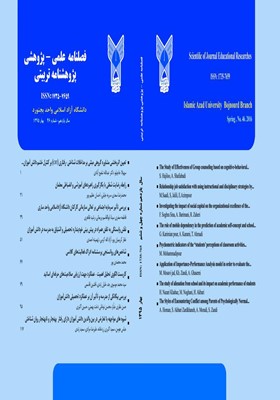رابطه رضایت شغلی با بکارگیری راهبردهای آموزشی و انضباطی معلمان
محورهای موضوعی : علوم تربیتیمحمدرضا سعدی 1 , سریه جلیلی 2 , احسان عظیم پور 3
1 - کارشناسی ارشد آموزش ابتدایی- دانشگاه آزاد اسلامی ارومیه
2 - کارشناس آموزش ابتدایی- شاغل در آموزش و پرورش
3 - کارشناس ارشد تحقیقاتآموزشی- دانشگاه شهید مدنی آذربایجان تبریز
کلید واژه: معلمان, رضایت شغلی, راهبردهای آموزشی و انضباطی,
چکیده مقاله :
هدف از پژوهش حاضر بررسی رابطه رضایت شغلی با بکارگیری راهبردهای آموزشی و انضباطی معلمان است. روش پژوهش توصیفی از نوع همبستگی میباشد. جامعه این پژوهشمعلماندورهابتدایی،دوره اول و دوم متوسطهشهرستان چایپاره در استان آذربایجان غربیبود که از این تعداد201معلم(117نفرمردو84نفرزن) به روش نمونهگیری طبقهای انتخابشدند.برای گردآوری دادهها از رضایت شغلی مینه سوتا(MSQ)(1951)، پرسشنامههای راهبردهای آموزشی عظیمپور(1393) و راهبردهای انضباطی عظیمپور(1393) استفاده شد. برای تجزیه و تحلیل دادهها، از روشهای آمار استنباطی همبستگی پیرسون و رگرسیونچندگانه گام به گام استفاده شد. نتایج پژوهش نشان دادرابطه مثبت و تقریبا بالایی بین رضایت شغلی درونی با متغیرهای راهبردهای آموزشی و انضباطی معلمان وجود دارد و رابطه رضایتشغلی بیرونی با متغیر راهبردهای آموزشی غیرمعنادار و با متغیر راهبردهای انضباطی رابطهی کمی دارد. همچنیننتایج نشان داد براساس انواع رضایت شغلی معلمان میتوان بکارگیری راهبردهای آموزشی و انضباطی را پیشبینی کرد.
The aim of this study is Reviews Relationship job satisfaction with using instructional and disciplinary strategies by Teachers. The research method is descriptive correlational. This research society was primary school teachers, secondary first round teachers and secondary school teachers in Chaypareh city the West Azerbaijan province Out of which were selected 201 teacher (117 man and 84 woman) via stratified random sampling. For data collection was used from the Minnesota Job Satisfaction (MSQ) (1951), questionnaires instructional strategies Azimpoor(1393) and disciplinary strategies azimpoor (1393). For data analysis were used descriptive and inferential statistical methods including Pearson correlation and multiple regression step by step. The results showed there is almost high relationship positive between internal job satisfaction and the teachers instructional and disciplinary strategies variables, and the relationship between extrinsic job satisfaction variable educational strategies was not significant and has little relationship with the variable disciplinary strategies. The results also indicated that job satisfaction can to predict use of a variety of disciplinary strategies by teachers.

